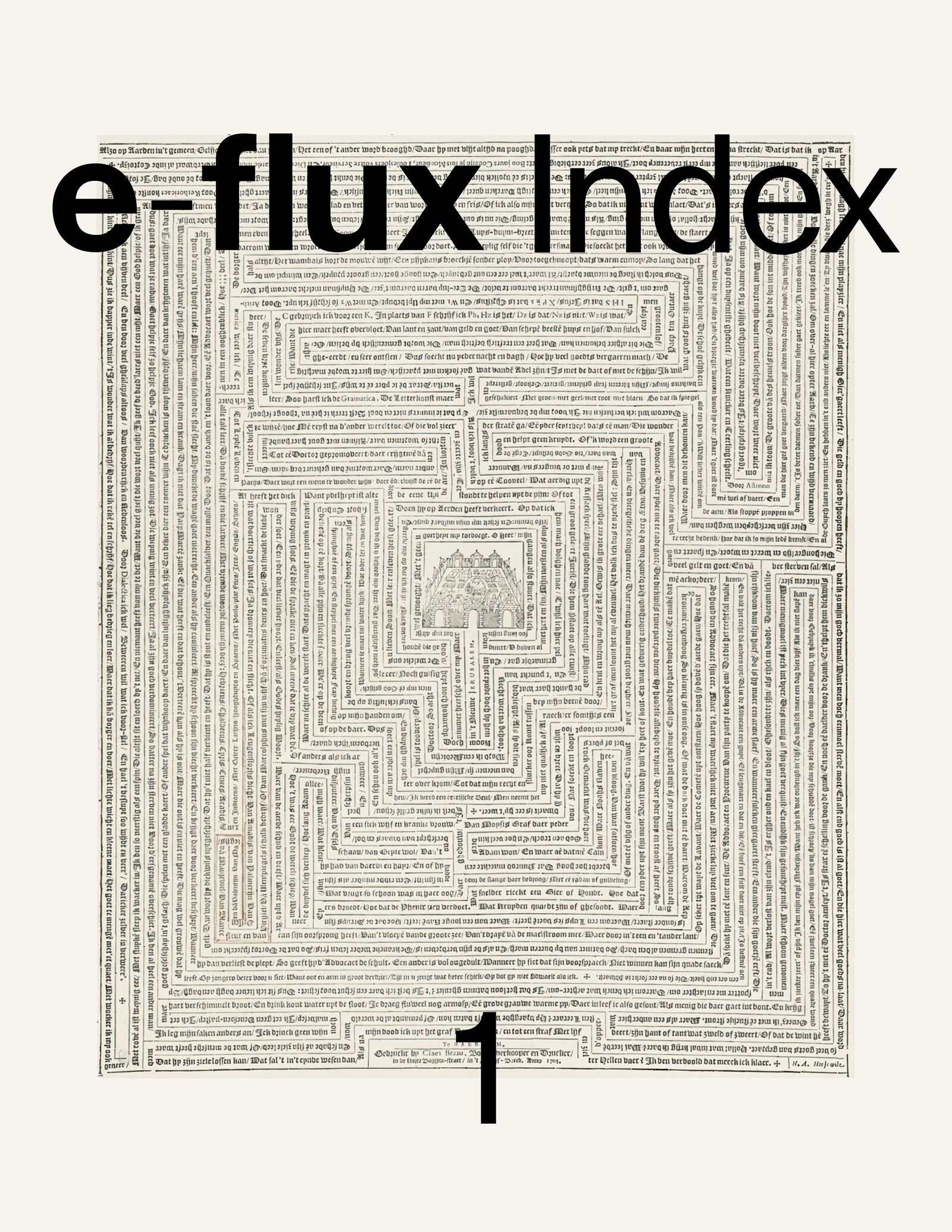KW Institute for Contemporary Art, Berlin
We are thrilled to announce the publication of the first issue of e-flux Index, a bimonthly compilation of today’s most vital writing on art, culture, and theory from across e-flux’s platforms, available as a pdf here.
A special, print edition of e-flux Index will be launched in Berlin at the KW Institute on May 10, 2024, and later that month in New York. Details are forthcoming. The Index will be available in a limited print edition for institutional and individual subscribers, as well as selected booksellers internationally.
e-flux Index combines long form essays from e-flux Journal and Architecture, reviews of exhibitions, books, and films from e-flux Criticism, articles and interviews by students and teachers from e-flux Education, and opinion pieces from e-flux Notes, organizing them thematically to draw out new strains of inquiry. Though these lines of inquiry are presented distinctly, together they should be understood to intertwine and overlap:
“Archives of our own destruction” examines the long noirish shadows the Cold War still casts over our current moment.
Living with Ghosts explores the domain of the many specters and ghosts (both friendly and malevolent) with whom we are forced to cohabit.
Becoming One’s Own Ancestor gathers pieces that yogically stretch and expand the limits of the human body, of embodiment, and of “the human” itself.
The Perpetual Peace of the Graveyard addresses the myriad contemporary forms of psychic and physical violence, from wars fought in the name of “civilization” to the impossibility of actually depicting peace.
“Tomorrow we will not work” shuttles between the radical forms of go-slow, quiet quitting, and social refusal that comprise the decision to down tools.
The Nurse Log purloins a term from silviculture forestry terminology to examine paradoxes of sustainability, ecology, wastage, and re-usage.
The Polycrisis groups pieces which engage questions of cosmopolitanism, nationalism, and neocolonial territorialization.
Counter-citational Models turns from the larger abstraction of the nation-state to the little nations of the museum, opening up questions of exhibition-making and curatorial strategy.
Finally, Benches out of Snow collects texts that ask: How to overcome institutional inertia and sclerosis? In different ways, each of these contributions sets out to address the problems of the commons, of living together, and what remains of the public sphere.
The issue features contributions from Katherine Adams, Zdenka Badovinac, Stephanie Bailey, Pietro Bianchi, Iago Bojczuk, Manuel Borja-Villel, Nathan Brown, Valentin Diaconov, Sonia D’Alto, Aziba Ekio, Octavian Esanu, Kim Förster, Yuriko Furuhata, Boris Groys, Gracie Hadland, Angela Harutyunyan, Jörg Heiser, Fumi Kashimura, Sami Khatib, Ikko Kobayashi, Vasif Kortun, Olexii Kuchanskyi, Michael Kurtz, Xinyue Liu, R. H. Lossin, Artemy Magun, Christoph Menke, Dorota Jagoda Michalska, David Morris, Novuyo Moyo, Christ Mukenge, Antonio Negri, Sandra Neugärtner, Tausif Noof, Christian Nyampeta, Hans Ulrich Obrist, Matteo Pasquinelli, Jennifer Piejko, Feza Kayungu Ramazani, Jason Read, Jose Rosales, Lydia Schellhammer, Peter Sealy, Laila Seewang, Jason E. Smith, Nicole Starosielski, Paul Stephens, Kate Sutton, Oxana Timofeeva, Jacinda S. Tran, Judith Wilkinson, Evan Calder Williams, and Jenny Wu.
e-flux Index is meta-edited by George MacBeth and designed by Remco van Bladel, with layout by Sixing Xu.


